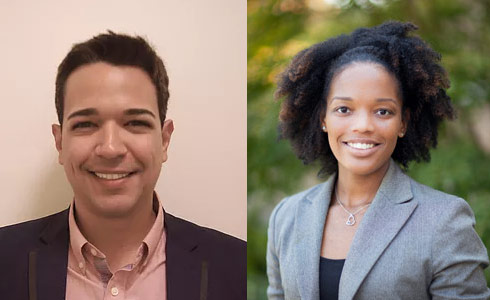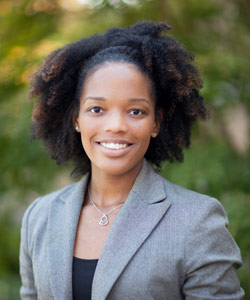

UC San Diego Computer Science and Engineering Ph.D. students Alexander Gamero-Garrido and Angelique Taylor have been awarded the selective 2019 Microsoft Research Dissertation Grant for their proposed research on international internet traffic disruption and making robots work more effectively with human teams, respectively.
The award aims to increase the pipeline of diverse talent receiving advanced degrees in computing-related fields by providing funding for doctoral students who are underrepresented in the field of computing, including those who self-identify as a woman, African American, Black, Hispanic, Latinx, American Indian, Alaska Native, Native Hawaiian, Pacific Islander, and/or people with disabilities.
More than 200 proposals for the grant were submitted in 2019. Awards were made based on the technical merit and potential for impact of the proposed dissertation research. The grants provide funding up to $25,000, and recipients can attend Microsoft’s Ph.D. Summit held October 13-15 at Microsoft Research’s headquarters in Redmond, Washington, where they will be able to network and show off their research.
Gamero-Garrido’s research focuses on the identification of Autonomous Systems (network operators) that can manipulate and disrupt internet traffic at a country-wide level to determine how these operators may connect to one another and how attacks on or accidents involving these operators could affect internet connectivity and take popular services offline. His advisors are CSE Professor Alex Snoeren and Research Scientist Alberto Dainotti at UC San Diego’s Center for Applied Internet Data Analysis.
The national security aspects of the project reflect Gamero-Garrido’s belief, which he shares with younger researchers, “that we can use the great tools of computing to apply problems that we’re passionate about, and that are not traditionally in the spotlight.”

Taylor, who works with CSE Professor Laurel Riek, is researching and designing computer vision methods that enable robots to effectively collaborate and work with groups of people in a team. Her dissertation work is aimed at creating a system that enables robots to seamlessly detect and track groups, predict their future motion trajectories, navigate among them through often-chaotic human crowds, and socially interact with them.
This high-level understanding of human groups could help robots better work alongside humans in hospitals, schools and shopping malls, where 70 percent of the people are often in groups in everyday settings, according to Taylor. [Watch a video about her project.]
“The MSR grant relieves me of worrying about funding issues so that I can exclusively focus on my research and finish my dissertation in a timely manner,” she said.

